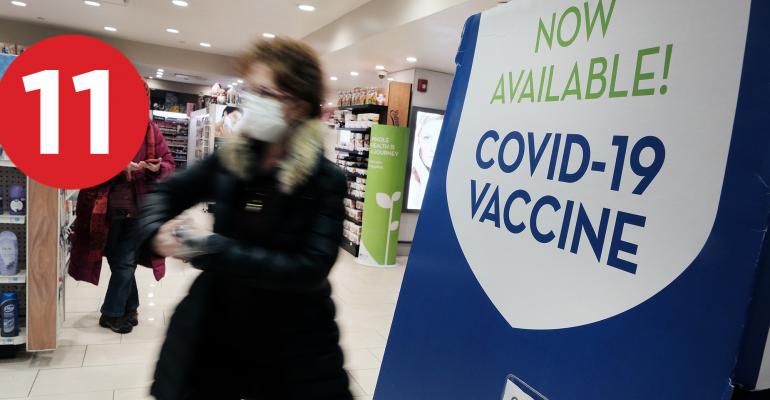- Google tells employees they’ll lose pay and will eventually be fired if they don’t follow vaccination rules “A memo circulated by leadership said employees had until Dec. 3 to declare their vaccination status and upload documentation showing proof, or to apply for a medical or religious exemption. The company said after that date it would start contacting employees who hadn’t uploaded their status or were unvaccinated, as well as those whose exemption requests weren’t approved.” (CNBC)
- JPMorgan tells unvaccinated Manhattan staff to work from home “In a memo to staff on Monday announcing the policy change, the bank urged unvaccinated staff to get vaccinated and for eligible employees to get booster shots. It also relaxed mask requirements for vaccinated staff working in its Manhattan offices.” (Reuters)
- Uber, Google, Ford Delay Office Return as Omicron’s Spread Threatens Business Districts “Now, a small but rising number of companies have modified or delayed plans as uncertainties swirl over the severity of the variant and its resistance to vaccines. That list includes Lyft Inc., Ford Motor Co. , Uber Technologies Inc. and Alphabet Inc.’s Google, though not all point to the new variant as the reason.” (The Wall Street Journal)
- California Population Loss Accelerated During Pandemic “The researchers examined anonymized credit bureau data and found that the downward trend in net domestic migration has been accelerated by a 38% decrease in the number of new arrivals between March 2020 and September of this year. The number of new arrivals declined in all of the state’s 58 counties.” (The Wall Street Journal)
- How corporate real estate investors affect tight housing markets “In some neighborhoods, those companies own closer to 50% of the single-family homes built since the year 2000; that tally doesn’t include other properties like condos and Airbnbs. Nashville’s not alone. Chilton said that single-family home inventory is tight throughout the country.” (Marketplace)
- N.Y.C.’s Gas Ban Takes Fight Against Climate Change to the Kitchen “The City Council is expected on Wednesday to approve a bill banning gas hookups in new buildings — effectively requiring all-electric heating and cooking — after weeks of intense negotiations, council staff members and lobbying groups said. The ban will take effect in December 2023 for buildings under seven stories; for taller buildings, developers negotiated a delay until 2027.” (The New York Times)
- The Wellness Real Estate Company Cashing in on Pandemic Fears “If wellness has become a ubiquitous catchall for the kinds of frictionless, health-adjacent perks good money can buy, wellness real estate can make the association between luxury and health particularly concrete: Other companies have developed ‘health and wellness’ office buildings with juice bars and yoga studios, or private residences that automatically check diabetic residents’ vision.” (The New Republic)
- Investors Hot For Hotels, Even Though The Hoped-For Discounts Didn't Materialize “Hotels have been trading briskly lately as one-off sales, portfolio deals and hotel owner M&A. There were 90 single-asset hotel sale transactions over $10M each in Q3 2021, totaling $14.4B and including about 27,000 hotel rooms, according to LWHA data. In Q3 2020, LWHA tracked 12 single-asset sales of that size totaling only $829M, representing about 2,700 hotel rooms.” (Bisnow)
- New fund aims to close disaster relief gap for multifamily owners “New York-based and housing nonprofit Enterprise Community Partners, along with Morgan Stanley, announced in November that it launched a $25 million fund to provide loans of for multifamily property owners to repair their buildings while they wait for federal disaster relief funding, according to a news release.” (New Orleans City Business)
- D.C. Is Taking A Closer Look At Converting Downtown Office Space Into Housing “The effort is intended to map out a new future for downtown, where demand for office space — already on the decline before the pandemic — is expected to take a nosedive as more employers embrace telework for the long term. Currently, D.C.’s central business district is 92% commercial and 8% residential, according to DMPED, and the central business district had a vacancy rate approaching 17% in the third quarter of 2021.” (DCist)
- Real estate is drunk on ESG. But what’s in the cocktail? “To make real progress on climate change, you need to know where to start. No one expects the industry to ditch bad practices overnight. Gradual change, spurred by capital markets, investors, tenants and regulation, is the best-case scenario, which is why benchmarking is crucial.” (The Real Deal)
0 comments
Hide comments





